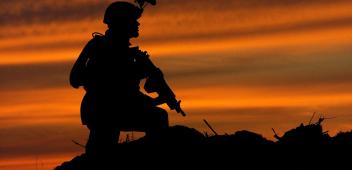Australians haven’t given up on the United States — yet
Originally published in The Washington Post.

Michael Fullilove is the executive director of the Lowy Institute in Sydney. He is the author of “Rendezvous with Destiny: How Franklin D. Roosevelt and Five Extraordinary Men Took America into the War and into the World.”
Over the past three-quarters of a century, Australians and Americans have worked together as close allies, from the U.N. Security Council chamber to the conference rooms of Asia to the mountains of Afghanistan. They have cooperated on diplomatic problems, shared intelligence and, from time to time, fought and died together on distant battlefields.
Today Australians still look to America. But what they see makes them heartsick and worried.
Donald Trump’s election as president has shown America in a strange and unfamiliar light. The official response to the covid-19 pandemic has made America look weak. The killing of George Floyd, and Trump’s militarized response to the protests that followed, have shown Australians an America that is divided and unjust.
Australians no longer recognize the America they see on the news. They’ve watched as police officers and soldiers deploy in riot gear without identifying markings. They’ve seen Attorney General William P. Barr order the clearing of peaceful protesters from Lafayette Square for the sake of a presidential photo op. (As they dispersed the demonstrators, U.S. Park Police launched an unprovoked attack on Australian journalists, generating anger here in Australia.) And they’ve heard Defense Secretary Mark T. Esper recommend that governors dealing with protests should “dominate the battle space.”
This past weekend, Australians watched in dismay as Trump fenced the White House off from America, just as he wants to wall America off from the world.
Australians are alliance believers, so they were alarmed in 2016 by the election of an alliance skeptic as president. On other subjects, too, the new president’s preferences differed from most Australians’ worldview. Trump is sympathetic to isolationism; Australians are inclined toward internationalism. Trump is hostile to free trade; Australia is a trading nation. Trump swoons over autocrats and strongmen; Australia is an old democracy and a free society.
Trump’s America was already self-isolating before the coronavirus pandemic, sloughing off allies and stepping back from the world.
The coming of covid-19 made the United States look seriously unwell: febrile, weak and disoriented. During the pandemic, Trump has flailed around like a fool. But the broader U.S. response to the coronavirus pandemic has also been unimpressive.
The reasons include poor state capacity, excessive individualism, the lack of universal health care and the hyper-partisan political culture. But the figure of 110,000 American dead allows for no other conclusion.
And yet Australians have not yet lost faith in America.
In part this is because they can’t afford to. Lowy Institute polling shows that only one-quarter of Australians have confidence in Trump to do the right thing in world affairs, and two-thirds of Australians say Trump has weakened Australia’s alliance with the United States. But an even larger number says the U.S. alliance remains important for Australia’s security.
Australians occupy an immense continent located far from their historic sources of security and prosperity. Their deepest strategic instinct, therefore, has always been to make common cause with a like-minded global ally — first, Great Britain and later, the United States.
Since 1951, when Australia, New Zealand and United States signed the ANZUS Treaty at the Presidio in San Francisco, Australia has been a treaty ally of the United States. As the only country to fight beside the United States in every major conflict of the 20th and 21st centuries, Australia has a good claim to being America’s best ally.
The U.S.-forward presence in Asia since World War II has underpinned regional stability. That presence is even more important to Australia now. China has overtaken the United States as Australia’s most important economic partner. But a region dominated by China — a superpower run by a Leninist political party — would not serve Australia’s interests.
Beijing proved this point in recent months by meting out economic punishment and censure after Canberra dared to call for an independent international investigation into the origins of the novel coronavirus. Australians worry about Donald Trump’s fecklessness, but they fear Xi Jinping’s recklessness.
This is not just about national interests, however. It is also about values.
Australians still want to believe in America. They admire the land of Lincoln, Roosevelt and King, the nation that sins and falls short but ultimately redeems itself.
And unlikely as it seems, perhaps these times of plague, recession and civil unrest provide some hope that America will indeed find redemption. There is reason for hope in the backlash to Trump’s mismanagement of the pandemic; in the spreading realization that his administration is disintegrating; in the diverse and overwhelmingly peaceful protests across the United States; in the sight of a U.S. senator joining a march or a National Guardsman taking a knee.
Scales have fallen from many Americans’ eyes, revealing the truth about racial discrimination but also about Donald Trump. All this dysfunction, violence and division has taken place on the president’s watch, and surely that will count in November. Perhaps this ghastly fever dream is nearly over.
Australians still look to America. They don’t want to hear a requiem for the United States. They are listening for the reveille.


